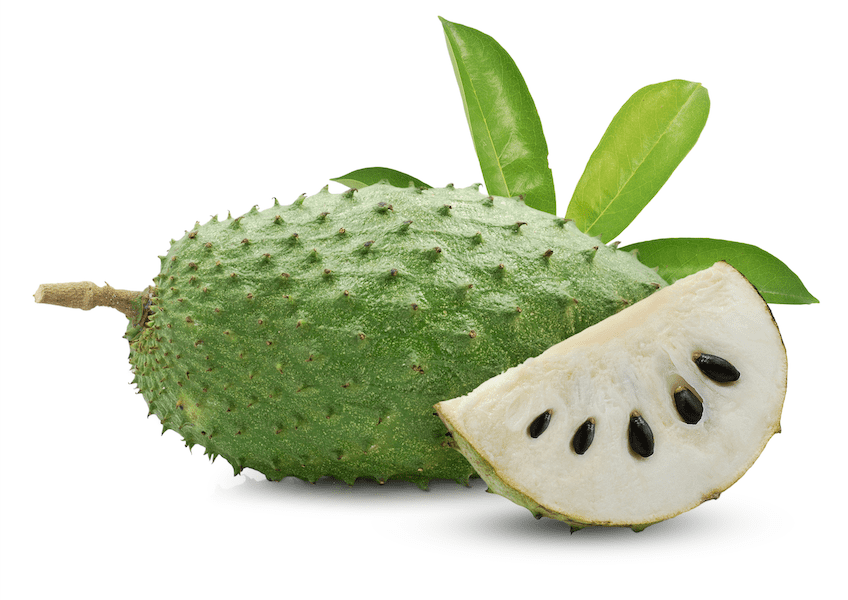Soursop is a delicious fruit with nutrient-dense flesh that has been linked to numerous health benefits. This fruit can be used for your skin, hair, and health, making it a versatile supplement.Â
So, just what is soursop, and what are its uses, benefits, and side effects? We’ve discovered the ins and outs of this fruit so you can learn more about it before adding it to your daily diet.
What is Soursop?
Soursop, also known as guanabana, (Annona muricata) belongs to the Annonaceae family and comes from the Graviola tree. This tree is an evergreen that’s native to Mexico, the Caribbean, Central America, and South America. This green fruit has a prickly outer shell with a creamy, strong-flavored inside flesh.
Typically, soursop is eaten raw by cutting the fruit half and scooping out the flesh. The inside of this fruit isn’t the only part of it that’s beneficial though, as its leaves and stems are used medicinally as well.
Within the fruit lies many nutrients including a small amount of niacin, riboflavin, folate, and iron. Because soursop is so rich in vitamins and nutrients, it’s often used daily for its numerous benefits for one’s skin, hair, and overall health.
Benefits
From fighting bacteria to reducing inflammation, there are a plethora of benefits that come with the consumption of soursop. These benefits include:
Benefits when taken orally:
- Improved immunity, due to its large amounts of vitamins and antioxidants.
- Replenishment of essential vitamins
- Contains bacteria-fighting capabilities
Benefits when applied topically:
- Treats itchy skin, due to its antiviral and anti-inflammatory properties.
- Helps heal acne, due to its antibacterial properties.
- Treats dandruff and head lice
When combined with a balanced diet and a healthy lifestyle, this fruit may have some impressive benefits for your health.
Side Effects
Though soursop is generally believed to be healthy for human consumption, there are a few side effects to be cautious of. Although there is more research needed to confirm these side effects, it’s important to learn about them so you know what to look out for.
Some of the adverse reactions that may come with consuming soursop include the potential to kill nerve cells in the brain and other parts of the body, as well as possibly causing movement disorders such as Parkinson’s disease.
If you’re pregnant or breastfeeding, avoid using soursop as it is possibly unsafe when taken by mouth. All in all, it’s recommended that you speak with a healthcare professional before adding soursop to your daily diet in order to avoid any possible complications.
How to Take Soursop
Not only are there many benefits that come with soursop, but it’s also a super versatile fruit that can be consumed in multiple ways. These methods for consumption include:
- Eaten raw
- Added to smoothies
- Made into teas
- Applied in a hair mask
- Made into an extract
- Applied as a lotion
It’s important to keep in mind that the seeds of the soursop should be avoided, as they have been shown to contain annonacin, a neurotoxin that may contribute to the development of Parkinson’s disease.
The Bottom Line
Soursop has a naturally strong and sweet flavor and can be enjoyed in a variety of ways. From eating the fruit raw to applying it to your hair and skin, there are many ways one can reap the benefits of this delicious fruit.
If you are thinking about adding soursop to your diet, you should consult with your doctor first. They will be able to provide more information on whether or not soursop would be a healthy addition to your diet.
Further, when purchasing products that contain soursop, look to the packaging labels for more information. You may want to look out for the following:
- What, if any, government labels the package has to determine the level of regulation and testing the product underwent
- Other ingredients in the product that you could be sensitive to
Disclaimers: This article does not constitute professional medical advice, nor can it replace the advice of a licensed professional.
Further Reading
Echinacea – Uses, Benefits, and Side Effects
Ashwagandha – Uses, Benefits, and Side Effects
Hawthorn Berry – Uses, Benefits, and Side Effects










